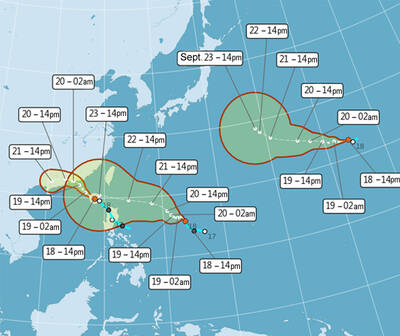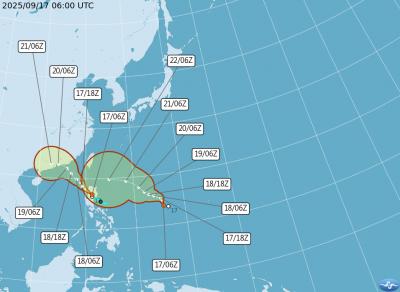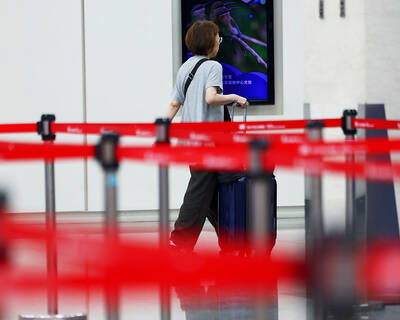New Minister of Transportation and Communications Wang Kwo-tsai (王國材) yesterday pledged to run the Taiwan Railways Administration (TRA) more like a corporation within three years, adding that he would resign if plans to reform the agency fail.
Wang made the remarks at a meeting of the legislature’s Transportation Committee, where the ministry was scheduled to brief lawmakers on the progress of plans to form “travel bubbles” with other countries.
However, committee members focused on Wang’s plans to reform the TRA, which he pledged when he took office on Tuesday.
Wang, previously a deputy minister, was promoted to minister when Lin Chia-lung (林佳龍) stepped down to take responsibility for the April 2 railway derailment that killed 49 people and injured more than 200.
Wang has appointed former Railway Bureau director-general Allen Hu (胡湘麟) as the new deputy transportation minister and promoted former TRA deputy director-general Du Wei (杜微) to head the railway agency.
Officials who are familiar with the agency’s core issues and are capable of addressing them are needed to carry out reform, Wang said.
However, Taiwan People’s Party Legislator Andy Chiu (邱臣遠) compared the appointments to “putting old wine into a new bottle,” and asked how the ministry could reform the TRA when it simply promoted current officials without recruiting new ones.
Wang said that he was the executive director of an ad hoc group formed by the Executive Yuan to conduct a comprehensive examination of the TRA after a Puyuma Express derailment in 2018 killed 19 passengers and injured 215.
The ad hoc group listed 144 issues with the TRA and made recommendations accordingly, he said.
“The TRA had followed the suggestions made by the ad hoc group, such as enhancing the maintenance of train cabins and main compressors,” he said. “Building open-cut tunnels to enhance the safety of side slopes was one of the recommendations, but the Taroko Express derailment on April 2 exposed problems with construction site management, which was really frustrating.”
“The TRA is improving in many ways, but new problems have emerged during the process,” he said.
Asked about a timetable for reform, Wang said that it would be carried out in three stages.
Within one year, the ministry would address urgent railway safety issues and integrate the TRA’s electrical engineering, rolling stock, construction and transportation departments by setting up several regional operation centers, he said.
The second phase would involve dealing with the TRA’s financial losses and the third phase turning it into a corporation, he said.
The Executive Yuan has agreed to compensate the TRA for the financial losses that it has sustained for managing small and unprofitable railway stations, Wang said, adding that it agreed to handle the debts that the TRA has accumulated over the years due to an old pension system.
Lawmakers and the Executive Yuan have proposed amendments to the Railway Act (鐵路法), which would grant the TRA greater flexibility in using its properties and assets, he added.
In three years, the TRA would begin to operate like a corporation, he said, without specifying when it would make the transition.
Wang also told Chinese Nationalist Party (KMT) Legislator Hung Mong-kai (洪孟楷) that he would step down if his plans for reform fail.
The TRA is scheduled to submit a new ticket pricing scheme to the Ministry of Transportation and Communications by the end of this year, as the agency has not adjusted fares for 26 years.
However, “adjusting train fares would not be the ministry’s top priority,” Wang said, adding that its first and foremost task is to increase the TRA’s revenue.
Democratic Progressive Party Legislator Chen Ming-wen (陳明文) asked Wang if he would reverse some of the transportation policies stipulated during Lin’s term, such as extending the high-speed rail line to Pingtung and Yilan counties.
The ministry would continue to implement the projects, Wang said.

NEW AGREEMENT: Malaysia approved imports last year after nearly two years of negotiations and inspections to meet quarantine requirements, officials said Up to 3.6 tonnes of pomeloes from Taiwan cleared Malaysian customs on Friday, in the first shipment of Taiwanese pomeloes to Malaysia. Taiwan-grown pomeloes are popular in domestic and overseas markets for their tender and juicy taste, the Ministry of Agriculture’s Animal and Plant Health Inspection Agency said. The fruit is already exported to Japan, Canada, Hong Kong, Singapore and the Philippines, it added. The agency began applying for access to the Malaysian market in 2023, compiling data on climate suitability, pests and diseases, and post-harvest handling, while also engaging in nearly two years of negotiations with Malaysian authorities and submitting supplementary

PEAK MONTHS: Data showed that on average 25 to 27 typhoons formed in the Pacific and South China seas annually, with about four forming per month in July and October One of three tropical depressions in the Pacific strengthened into a typhoon yesterday afternoon, while two others are expected to become typhoons by today, Central Weather Administration (CWA) forecaster Lee Ming-hsiang (李名翔) said yesterday. The outer circulation of Tropical Depression No. 20, now Typhoon Mitag, has brought light rain to Hualien, Taitung and areas in the south, Lee said, adding that as of 2pm yesterday, Mitag was moving west-northwest at 16kph, but is not expected to directly affect Taiwan. It was possible that Tropical Depression No. 21 would become a typhoon as soon as last night, he said. It was moving in a

One of two tropical depressions that formed offshore this morning could turn into a moderate typhoon by the weekend, the Central Weather Administration (CWA) said today. Tropical Depression No. 21 formed at 8am about 1,850km off the southeast coast, CWA forecaster Lee Meng-hsuan (李孟軒) said. It is expected to move in a northwesterly direction as it continues building momentum, possibly intensifying into Typhoon Mitag this weekend, she added. The radius of the storm is expected to reach almost 200km, she said. It is expected to approach southeast of Taiwan on Monday and pass through the Bashi Channel between Tuesday and Wednesday,

About nine Taiwanese are “disappeared,” detained, or otherwise deprived of freedom of movement in China each month, the Mainland Affairs Council (MAC) said yesterday. Between Jan. 1 last year and Aug. 31 this year, 188 Taiwanese travelers went missing, were detained and interrogated, or had their personal freedom restricted, with some questioned in airports or hotel lobbies, the council said. In a statement ahead of the Mid-Autumn Festival, the council urged people visiting China for any reason to be highly vigilant and aware of the risks. Of the reported cases, 50 people were “disappeared” after entering China, 19 were detained and 119 had